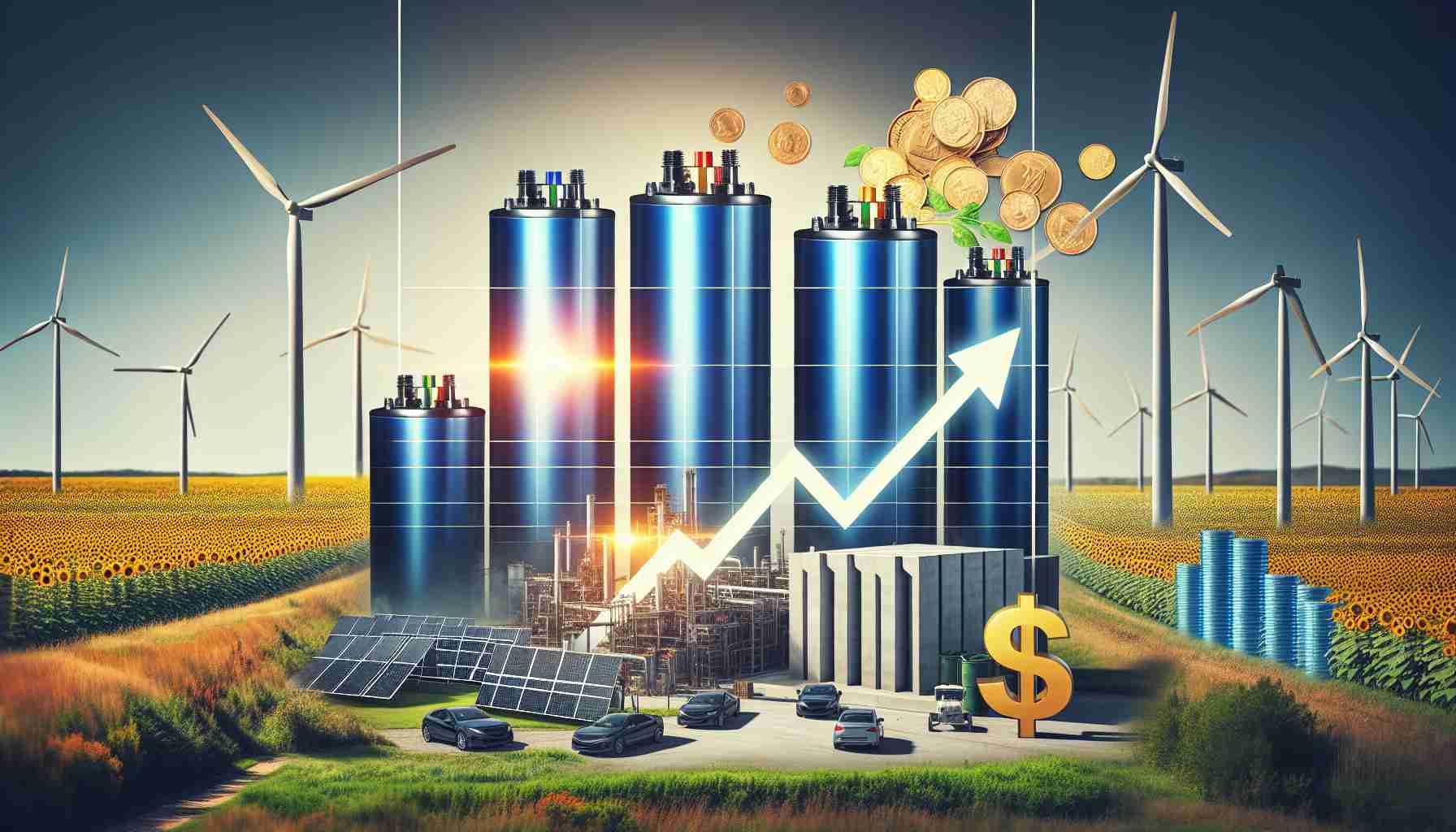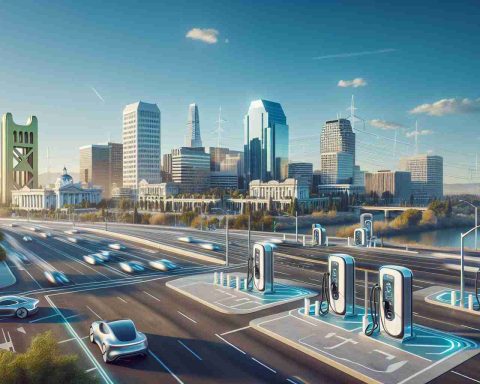Kansas Embraces Lithium-Ion Battery Production
In a groundbreaking development for Kansas, Panasonic is set to commence lithium-ion battery production at a sprawling 300-acre facility in De Soto by March. This initiative is recognized as one of the largest economic ventures in the state’s history, bringing together local lawmakers and corporate leaders.
The construction of the plant began in late 2022 and aims to manufacture over 60 batteries every second, boosting the electric vehicle market significantly. The Democratic Governor, Laura Kelly, emphasized this project signals Kansas’s commitment to renewable energy and positions the state as a crucial player in global clean energy transitions.
Even before the plant begins operations, its impact is already notable, with approximately 3,800 construction workers swelling the local population. This influx has spurred the development of new infrastructure, roads, and businesses to support the workers. By summer, the facility plans to employ around 1,000 workers, growing to 2,000 by 2026.
Local political figures predict that the economic surge from this project will outpace the initial investment provided through state tax incentives. In fact, increasing sales tax revenues have already led to a reduction in property taxes for residents.
While some, like Republican state Sen. Mike Thompson, express skepticism about the long-term viability of electric vehicle demand, local leaders remain optimistic about the economic growth and innovation this project could yield for Kansas’s future.
Powering the Future: The Broader Impact of Kansas’s Lithium-Ion Battery Initiative
The establishment of Panasonic’s lithium-ion battery facility in De Soto is a transformative moment not just for Kansas, but for the wider implications of renewable energy production in the U.S. and beyond. As electric vehicles (EVs) become increasingly vital to reducing carbon emissions, this initiative places Kansas at the forefront of a burgeoning industry likely to shape the global economy for decades.
Economic Ramifications: The rise of battery production in Kansas not only elevates the state’s economic profile but also disrupts traditional manufacturing territories. States like California and Texas have dominated the EV market; however, Kansas is poised to become a strategic player in the supply chain. As demand for EVs surges—projected to reach approximately 54 million units sold globally by 2040—Kansas could capitalize on this shift, potentially attracting other manufacturers and suppliers to the region.
Environmental Considerations: The lithium-ion batteries produced in De Soto promise a significant reduction in greenhouse gas emissions through their application in clean energy technologies. However, the extraction and processing of lithium and other materials pose environmental challenges, including ecosystem disruption and high water usage. Thus, it becomes imperative for both policymakers and manufacturers to implement sustainable practices that mitigate these impacts.
Future Trends and Long-Term Significance: As the world increasingly pivots towards sustainable alternatives, we can expect a growing emphasis on innovation within battery technology—particularly in recycling and lifecycle management. Kansas’s investment in lithium-ion production may serve as a catalyst for research and development, driving advancements that could redefine energy storage and consumption globally.
In conclusion, Kansas’s venture into the battery production realm signifies not just an economic opportunity but a crucial step toward a sustainable energy future, highlighting the intersection of technology, environment, and society.
Kansas Takes Charge in the Future of Electric Mobility: The Rise of Lithium-Ion Battery Production
Kansas Embraces Lithium-Ion Battery Production
Kansas is gearing up for a major economic transformation with Panasonic’s upcoming lithium-ion battery production facility in De Soto. Set to begin operations by March, this state-of-the-art plant, covering an impressive 300 acres, is not only significant for its size but also for its potential impact on the electric vehicle market and the broader renewable energy landscape.
# Features of the Panasonic Facility
The De Soto plant is designed to produce an astounding rate of over 60 batteries every second. This output could dramatically enhance the availability of batteries needed for electric vehicles (EVs), an industry poised for exponential growth as global demand for clean transportation solutions surges.
# Economic Impact and Job Creation
The construction, which kicked off in late 2022, has already had significant economic repercussions:
– Job Creation: Initially employing around 1,000 people by summer 2024, the workforce is expected to grow to 2,000 by 2026. This will inject substantial income into the local economy.
– Infrastructure Development: The influx of approximately 3,800 construction workers has prompted improvements in local infrastructure, including new roads and services that will cater to the growing population.
– Tax Revenue Increases: Local economies are already benefiting from increased sales tax revenues, prompting reductions in property taxes for residents.
# The Political Landscape
The project has attracted bipartisan attention, highlighted by Democratic Governor Laura Kelly’s strong endorsement, portraying it as a leap towards Kansas’s commitment to renewable energy. However, there are voices of caution. Republican state Senator Mike Thompson has raised questions about the future demand for electric vehicles, underscoring concerns about the longevity of such a market.
# Trends in Electric Vehicle Adoption
With increasing global awareness surrounding climate change, the electric vehicle sector is witnessing a significant boom. According to recent reports, EV sales have more than doubled in the past two years, driven by advancements in battery technology and favorable government policies globally. Kansas’s investments in battery production align with these trends, suggesting a promising outlook for future growth.
# Sustainability and Innovations
The establishment of the lithium-ion battery plant is not just about immediate economic benefits; it aligns with broader goals of sustainability and innovation. The shift towards electric mobility is expected to reduce reliance on fossil fuels and decrease greenhouse gas emissions, underlining Kansas’s proactive stance in the clean energy movement.
# Market Analysis and Predictions
Given the global shift towards electric vehicles, experts predict that investments in battery manufacturing will continue to rise. The U.S. lithium-ion battery market is projected to grow exponentially, with potential valuations exceeding $70 billion by 2027. Kansas, with its new facility, is positioned to play a critical role in this burgeoning market.
# Use Cases and Applications
Beyond automotive use, lithium-ion batteries produced in Kansas could be utilized across various sectors, including renewable energy storage, consumer electronics, and electric communication networks. This versatility highlights the broader implications of the battery production initiative.
In conclusion, as Kansas pioneers this essential aspect of the electric vehicle ecosystem, it is strategically aligning itself with the future of transportation, sustainability, and economic development. For more information on renewable energy initiatives, visit DOE Energy.









